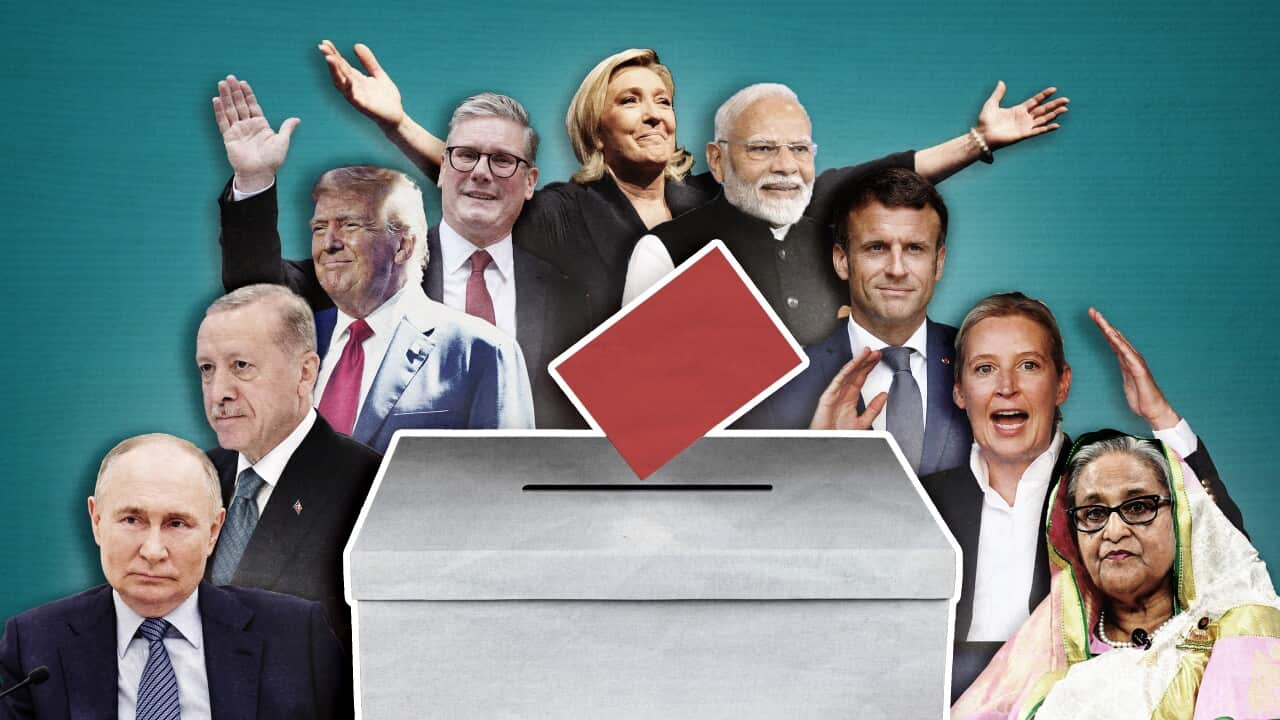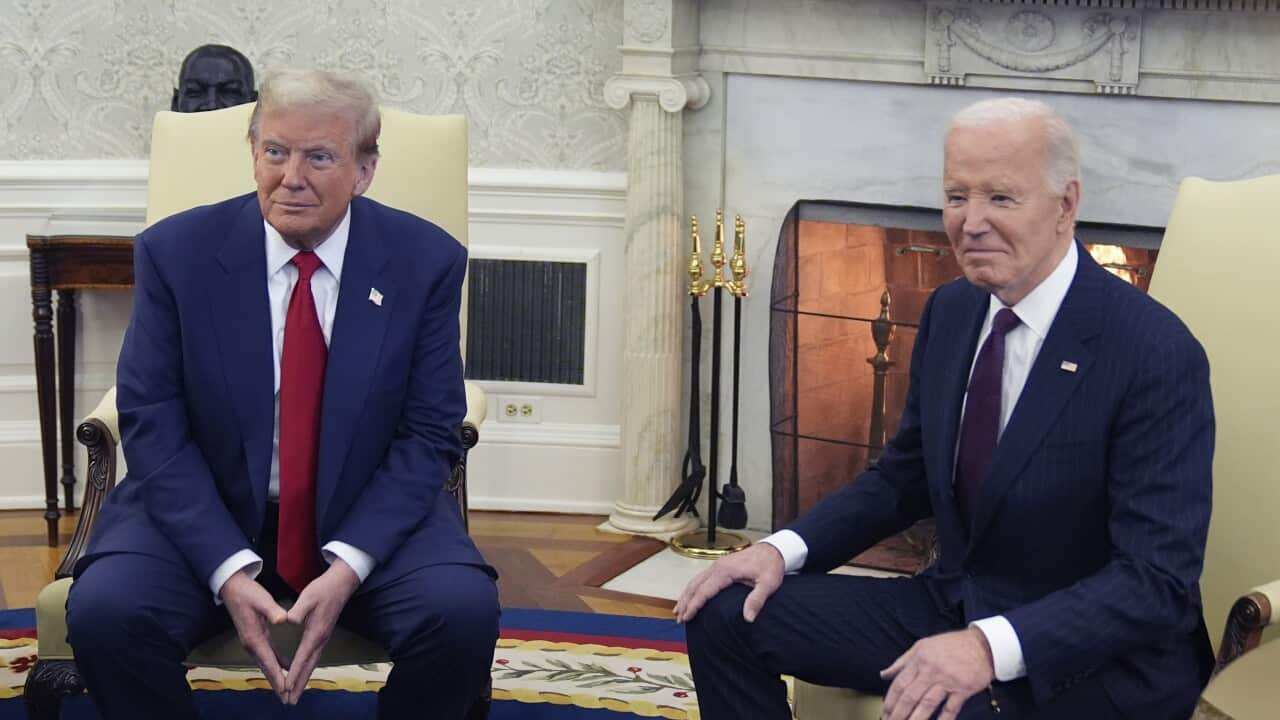Around half of the world's population in more than 70 countries headed to the polls in 2024, marking what was dubbed the 'super election year' — the biggest in human history.
A record-breaking 3.7 billion people , with many kicking out leaders they felt were not serving them.
The highest-profile of these was the United States election, in which former Republican president Donald Trump, in the run-up, faced off against the Democratic party's candidate Kamala Harris — a contest .

Donald Trump surrounded by family and supporters during his election night party on 6 November in Florida. Source: AAP / Matias J. Ocner/Miami Herald/TNS/ABACAPRESS.COM
Praino says the emergence of has been a significant challenge, pointing to accusations of foreign election interference.
"In particular the American election — the possibility of candidates [such as Trump] is of deep concern to all of us."
Praino explains the Western concept of democracy cannot co-exist with the idea of electoral irregularities, such as .
Trump's language has also had far-reaching consequences, Praino says, including in Australia, where are raising doubts about democratic processes despite the country's robust elections.
Mixed results around the world
Australian National University professor of constitutional law Matt Qvortrup agrees democracy has improved this year in some ways but gone backwards in others.
Qvortrup says democracy in Serbia appears to be slipping under the rule of the Serbian nationalist party SNS and its president Aleksandar Vučić. During a re-run of local elections in June, which were held following allegations of election fraud last year, observers noted dozens of irregularities, including vote-buying and duplicate voter registrations.
In Taiwan, voters, despite China denouncing him as a separatist. But Qvortrup notes the party has lost its majority in parliament, which will make it harder for Lai to pass legislation amid Chinese pressure for Taiwan’s "reunification" with the mainland.

William Lai (Lai Ching-te) was re-elected as Taiwanese president but his party lost its majority in parliament. Source: AAP / Daniel Ceng/EPA
It was a mixed picture in Türkiye where voters delivered a. His rival Ekrem İmamoğlu was re-elected as mayor of Istanbul and now represents the biggest threat to Erdoğan and his AK Party across two decades in power. While some believe it could be the beginning of the end for the strongman leader, Qvortrup says democracy in Türkiye is still "very much challenged".
Meanwhile, events in Bangladesh have been somewhat more encouraging. In January, then Prime Minister Sheikh Hasina won a fourth straight term in what some but she was later forced to flee the country . Renowned economist to lead a new interim government.

Sheikh Hasina was re-elected as Bangladeshi prime minister but later fled the country. Source: AAP / Tobias Hase/DPA
The rise of far-right groups, particularly in Germany and France, has also been concerning but Qvortrup says they have so far been kept out of power due to cooperation between more liberal parties.
Rise of the far-right
The far-right is considered a danger to democracy due to its connection to fascist ideals.
Associate professor Ben Wellings, a political scientist as Monash University, says its supporters are "happy to toy with" the pluralism — the co-existence of two or more political groups — that democracy requires.
This has made the rise of far-right groups concerning, especially during elections of the European Parliament in June.
The parliament features representatives voted in by citizens of European Union countries and is the second-largest democratic electorate in the world.
Marine Le Pen's far-right party — National Rally (RN) — got 31 per cent of the French vote.
This is substantially more than the 15 per cent won by French President Emmanuel Macron's Renaissance party as part of his coalition.
Germany's far-right Alternative für Deutschland (AfD) also won 16 per cent of the German vote.
In Wellings’s assessment, the right side of politics has shown more creative thinking and seems to be responding better to technological disruption than leftist and centrist parties.
The right ... are actually capturing ideas and imaginations in a way that [makes] the centre-left seem paralysed.Associate professor Ben Wellings, Monash University political scientist
Right-wing incumbent governments also appear to have weathered discontent over economic conditions more successfully.
Wellings points to India, where Prime Minister Narendra Modi's right-wing government has been able to cling to power even with its following national elections this year.
"[There's] something there about the right-wing messages fitting the voters' mood," Wellings says.
I think the mood is generally one of anger and resentment at the political class, particularly the left and the centre, over not being able to respond effectively to economic challenges.
Wellings adds that right-wing parties, such as the Republicans in the US, now appear to be representing society’s "worst-off", while centre-left parties represent those who are "better-off".
"Thirty years ago we could have expected that to be the other way around."
The right is setting the agenda
While the far-right has been unsuccessful in seizing power in some countries, support has grown globally and Wellings says it appears to be setting the agenda in some countries.
In France, Macron held a snap election in July to re-assert his position over RN, which had been emboldened during the European Parliament elections. RN ultimately polled third in the French election and is now the largest party in the country.
and this has forced him to work with both the left and the right in parliament.

French president Emmanuel Macron failed to re-assert the authority of his centrist alliance after a snap election following the rise of far-right party National Rally (RN). Source: Getty
Ahead of election day, AfD is polling at around 18 per cent of the electorate — although other parties have vowed not to cooperate with it, effectively blocking AfD from taking power.
Qvortrup believes AfD will poll well in Germany but support won't be high enough for it to form government.
"The threat from the far-right is a concern but we need to put it into perspective. The parties that want to absolutely undermine democracy get very few votes," he said.
[Far right parties] have not won elections, they have had strong showings in elections — it's a very big difference.
Praino says cooperation among centrist and left parties to keep far-right groups from claiming power in countries such as France shows politics is alive and well.
"There is always a way forward to ensure that the actual will of the majority of the population prevails, versus a relatively minor group hijacking the system based on the rules of the game."
Lessons for democratic parties
The rise of the far-right should be prompting democratic parties to address the policy concerns they're raising, such as how they address climate change and rising immigration, Qvortrup says.
"I think democracy has weathered the storm [so far] by being willing to listen to people," he says.
In the US, while Trump is seen as an authoritarian figure, Qvortrup says it's likely there'll be a and it's yet to be seen what he will do once in office.
Qvortrup notes that 10 states in the US also held referendums on abortion on election day, and at least four of these voted for Trump while also supporting more rights to abortion.
"So I think the American electorate is a sophisticated one," he says.
Trump will also likely lose his majority in Congress in two years' time and will be unable to run for a third term.
Qvortrup says changing the two-term limit on presidential candidates would require a two-thirds majority in Congress and a three-quarters majority in all US states.
"The mechanics of turning America into a system where governments cannot lose elections, like in Hungary or Venezuela and so on, is just very unlikely to happen."
Moving towards 'change' globally
Praino says the mix of election results this year — with a move to the right in the US and a move to the left in the UK — shows the world is basically "moving towards change".
I don't think that it's very clear at this stage that there is a proper shift to the right, but I think we will know very soon as these new political forces start governing [and] we will understand where they sit.Professor Rodrigo Praino, Flinders University
Wellings agrees and says there may be a difference between what Trump says and what he actually does.
However, Wellings says he would be nervous if he was an adviser to the Labor Party in Australia, which may also feel the wrath of voters at the polls next year if cost of living pressures do not improve.
Qvortrup says democracy is the only political system that accommodates different views and basically allows people to live together.
"Democracy has been on the run this year but [we] have occasionally stopped and confronted realities and have also in many ways succeeded. So I think we're in a better place now than we were a year ago.
"I would say democracy is fighting back."




